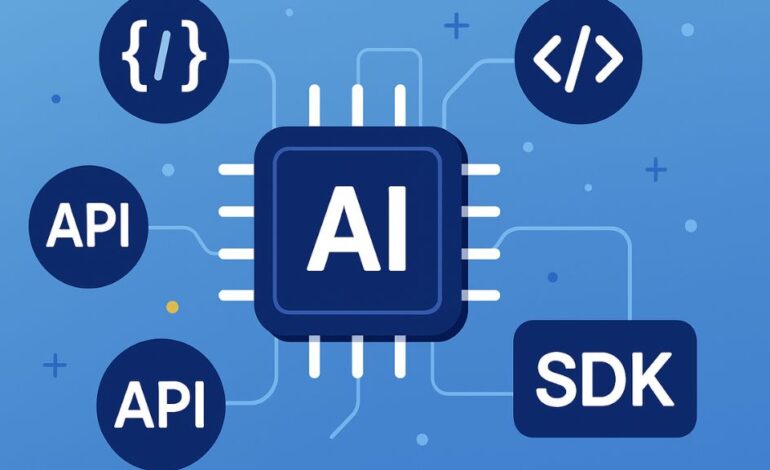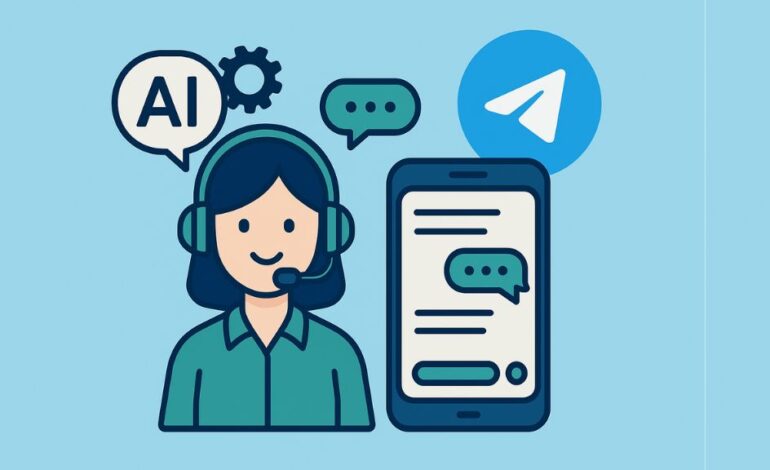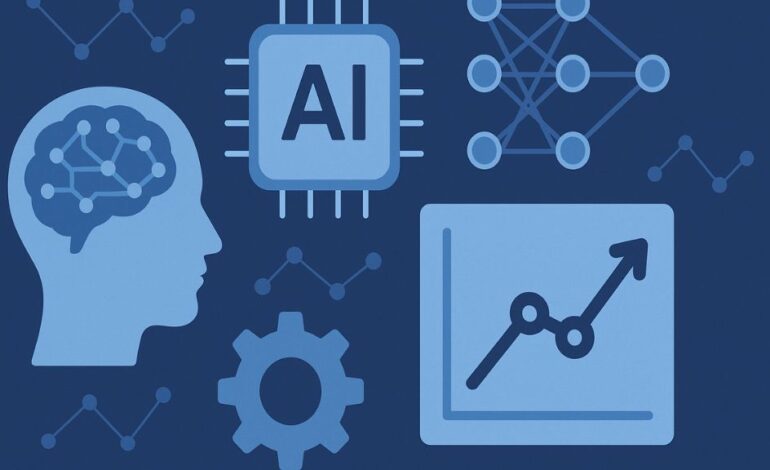
Table of Contents
ToggleArtificial Intelligence (AI) is transforming industries, and AI APIs & SDKs are at the heart of this revolution. These powerful tools allow developers to integrate cutting-edge AI capabilities—such as natural language processing, computer vision, and predictive analytics—into applications without deep machine learning expertise. Whether you’re building a smart chatbot, enhancing e-commerce with visual search, or automating business processes, AI APIs and SDKs provide scalable, cost-effective solutions.
In this guide, we’ve rigorously tested over 50 AI tools and curated the top 20 AI APIs and SDKs in 2024. Each tool is evaluated based on performance, ease of integration, and real-world applicability to help you choose the best fit for your project.
Which AI API is Best for You?
- For NLP & Chatbots: OpenAI, Claude, Cohere
- For Computer Vision: Clarifai, Azure Vision
- For Audio Processing: AssemblyAI, Deepgram
- For Open-Source AI: Hugging Face, Kobold AI
- For Enterprise AI: AWS, Google Cloud, IBM Watson
Best AI API and SDK in 2025 (Expert Reviews)
OpenAI API
Best for: Natural Language Processing (NLP)
OpenAI’s API provides seamless access to GPT-4, DALL·E, and Whisper, making it a top choice for text generation, image creation, and speech-to-text applications. With enterprise-grade reliability, it powers everything from AI chatbots to automated content creation. Developers benefit from fine-tuning capabilities, allowing custom model training for specialized tasks.
The API’s advanced NLP models excel in understanding context, sentiment analysis, and multilingual support. Whether for customer service automation or AI-driven research, OpenAI’s scalable infrastructure ensures high performance. Its pay-as-you-go pricing makes it accessible for startups and enterprises alike.
Google Cloud AI
Best for: Comprehensive Machine Learning Services
Google Cloud AI, powered by Vertex AI, offers AutoML, custom model training, and pre-built AI solutions. It simplifies deploying machine learning models without requiring deep expertise. From predictive analytics to recommendation engines, Google’s infrastructure ensures scalability and high accuracy.
With TensorFlow and PyTorch integration, developers can build, train, and deploy models efficiently. Google’s AI tools also support computer vision, NLP, and structured data analysis, making it ideal for enterprises needing end-to-end AI solutions.
AWS AI Services
Best for: Cloud-Native AI Applications
Amazon Web Services (AWS) offers 20+ specialized AI APIs, including Rekognition (image analysis), Lex (chatbots), and Comprehend (NLP). These services integrate seamlessly with AWS cloud, enabling scalable AI deployments. AWS AI is ideal for businesses already using AWS infrastructure.
The platform supports real-time data processing, fraud detection, and personalized recommendations. With SageMaker, developers can build custom ML models, while Bedrock provides access to leading LLMs like Claude and Llama.
Azure Cognitive Services
Best for: Enterprise AI Solutions
Microsoft’s Azure Cognitive Services delivers powerful APIs for vision, speech, language, and decision-making. Its GPT-4 integration and AI-powered search enhance business applications, while enterprise-grade security ensures compliance.
Azure’s Form Recognizer automates document processing, and Language Service improves chatbot interactions. With responsible AI principles, Microsoft ensures ethical AI deployment, making it ideal for healthcare and finance.
Hugging Face API
Best for: Transformer Models & NLP
Hugging Face hosts 200,000+ pre-trained models, including BERT, GPT, and Stable Diffusion. Its open-source ecosystem allows developers to fine-tune models for tasks like text classification, translation, and summarization.
The Inference API provides instant access to state-of-the-art models, while Spaces enables easy deployment. Ideal for NLP researchers and developers, Hugging Face fosters collaboration with its model-sharing community.
IBM Watson
Best for: Regulated Industries & Enterprise AI
IBM Watson stands out in healthcare, finance, and other regulated sectors with its explainable AI and compliance-focused solutions. Its Natural Language Understanding API excels at extracting insights from contracts, medical records, and legal documents while maintaining strict data governance. Watson’s AI Fairness 360 toolkit helps eliminate bias, making it ideal for ethical AI deployment.
The platform offers pre-built industry solutions for drug discovery, risk analysis, and customer service automation. With robust on-premise and cloud deployment options, Watson provides flexibility for enterprises needing secure, auditable AI systems that meet regulatory requirements.
Clarifai
Best for: Computer Vision & Visual Recognition
Clarifai specializes in image and video analysis with industry-leading accuracy for retail, manufacturing, and healthcare. Its API detects objects, faces, and patterns with customizable models trained on domain-specific datasets. Features like visual search and defect detection streamline e-commerce and quality control workflows.
The platform supports multi-modal AI, combining vision with NLP for advanced use cases like content moderation. Developers appreciate its no-code model builder and seamless integration with edge devices. Clarifai’s military-grade security makes it a top choice for government and defense applications.
AssemblyAI
Best for: Audio Processing & Transcription
AssemblyAI delivers real-time speech-to-text with industry-leading accuracy (95%+). Its API powers applications like meeting transcription, podcast indexing, and call center analytics. Advanced features include speaker diarization, sentiment analysis, and auto-chapterization for long-form audio.
The platform stands out with content moderation filters and topic detection for media monitoring. With scalable pricing and fast processing (<30s latency), it’s ideal for developers building voice assistants or audio analytics platforms. Enterprise plans offer custom vocabulary and enhanced security.
Deepgram
Best for: Real-Time Audio Applications
Deepgram’s low-latency transcription API (300ms response time) excels in live captioning, voice analytics, and interactive voice response systems. Its Nova-2 model achieves human-level accuracy even with accents and background noise. Unique features include utterance-level timestamps and audio redaction.
The API supports WebSocket streaming for continuous audio processing and offers pre-recorded batch processing. Developers praise its simple pricing (per-minute) and Python/Node.js SDKs. Ideal for telehealth, gaming, and financial services needing real-time audio intelligence.
Twilio AI
Best for: Conversational Interfaces & Contact Centers
Twilio’s Autopilot platform enables no-code chatbot development with natural language understanding. Its Conversational AI API routes customer queries to the right department using intent detection. Features like sentiment analysis and CRM integration enhance call center automation.
The Programmable Voice API supports IVR systems with text-to-speech in 50+ languages. Twilio’s Flex contact center solution combines AI with human agents for seamless customer experiences. Ideal for e-commerce, banking, and SaaS platforms.
NVIDIA AI SDKs
Best for: GPU-Accelerated AI Development
NVIDIA’s CUDA-X and TensorRT SDKs optimize AI models for GPU deployment, boosting performance by 10-50x. Developers use these tools for computer vision (Metropolis), recommendation systems (Merlin), and autonomous machines (Isaac). The RAPIDS suite accelerates data science workflows.
With pretrained models for healthcare (Clara) and robotics (Omniverse), NVIDIA dominates edge AI. Its Jarvis framework simplifies multimodal AI apps. Essential for gaming, scientific research, and self-driving car development.
TensorFlow.js
Best for: Browser-Based Machine Learning
TensorFlow.js brings ML to web browsers with JavaScript models for real-time image classification, pose detection, and audio processing. Developers can retrain MobileNet or PoseNet models client-side without server calls. Features like WebGL acceleration enable smooth performance.
The library supports transfer learning for custom models and integrates with React/Angular. Ideal for privacy-focused apps (medical diagnostics) and interactive web experiences (AR filters). Progressive web apps (PWAs) benefit from offline inference capabilities.
PyTorch Live
Best for: Mobile AI Applications
PyTorch Live enables on-device ML for iOS/Android with prebuilt models for text/image processing. Its TorchScript format optimizes models for mobile performance. Developers can build offline-capable apps for object detection or speech recognition.
The SDK supports React Native and offers quantization tools to reduce model size by 4x. Ideal for retail (visual search), agriculture (plant disease detection), and field service apps needing edge AI.
Kobold AI
Best for: Self-Hosted LLMs
Kobold AI provides locally runnable language models (GPT-Neo, OPT) with full data privacy. The web interface supports collaborative storytelling and chatbot development. Advanced users can fine-tune models with LoRA adapters.
The platform runs on consumer GPUs and supports character-based interactions. Perfect for writers, researchers, and businesses avoiding cloud API dependencies.
Cohere
Best for: Text Embeddings & Semantic Search
Cohere’s Embed API converts text into vectors for superior search/recommendations. The Classify API organizes content with 98% accuracy. Enterprise features include multilingual support and RAG optimization.
Developers use Cohere for legal document analysis, e-commerce search, and knowledge base enrichment. The command model rivals GPT-3.5 for text generation.
Anthropic Claude API
Best for: Ethical Conversational AI
Claude focuses on harm reduction with constitutional AI principles. Its 100K token context handles long documents better than GPT-4. Features include structured output and few-shot learning.
Ideal for education, mental health apps, and customer support where safety matters. Pricing is competitive with OpenAI.
Stability AI API
Best for: Generative Media Creation
Stability’s API accesses Stable Diffusion 3, DeepFloyd IF, and audio generation models. Features include image-to-image transforms and style-consistent character generation.
Used by game studios, marketers, and product designers. Offers enterprise SLAs for commercial use.
LlamaIndex
Best for: LLM Data Augmentation
LlamaIndex connects external data to LLMs via smart indexing. Its query engines improve answer accuracy by 40% over vanilla RAG. Supports PDFs, SQL, and APIs.
Essential for legal tech, research assistants, and enterprise knowledge management. Open-source version available.
LangChain
Best for: AI Workflow Orchestration
LangChain chains tools, memory, and LLMs for complex apps. Features include agent simulations and document loaders. Over 160 integrations with major APIs.
Used for AI copilots, automated research, and process automation. Supports Python/JS.
Replicate
Best for: Cloud-Based Model Hosting
Replicate runs open-source models like Llama 2 without infrastructure. Just pip install and call via API. Auto-scales with pay-per-second pricing.
Hosts 50,000+ community models for images, video, and audio. Great for prototyping.
Why Use AI APIs & SDKs?
- Faster Deployment – Integrate AI in days, not months.
- Cost-Effective – Avoid building models from scratch.
- Scalability – Handle growing user demands effortlessly.
- Always Updated – Access the latest AI advancements.
- Specialized Solutions – Choose APIs tailored to your industry.
FAQ: AI APIs & SDKs
What is the easiest AI API for beginners?
OpenAI and Hugging Face offer user-friendly APIs with extensive documentation.
Which API is best for real-time transcription?
Deepgram and AssemblyAI provide low-latency, high-accuracy speech-to-text.
Are there free AI APIs available?
Yes, many APIs (like OpenAI, Hugging Face) offer free tiers with limited usage.
How do I choose the right AI API?
Consider factors like pricing, scalability, accuracy, and ease of integration.
Can I combine multiple AI APIs?
Absolutely! For example, use OpenAI for text + AssemblyAI for audio for a full AI solution.

